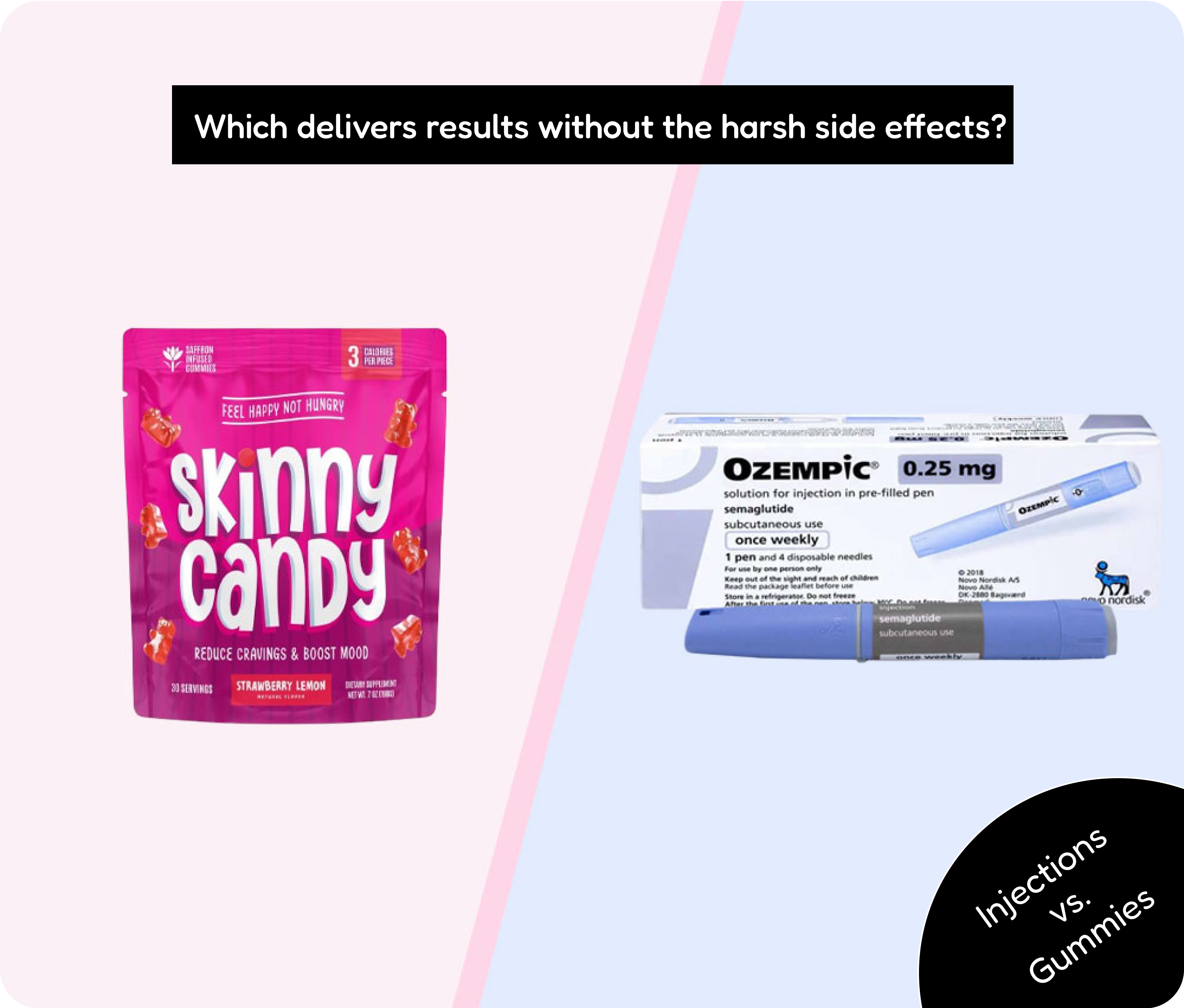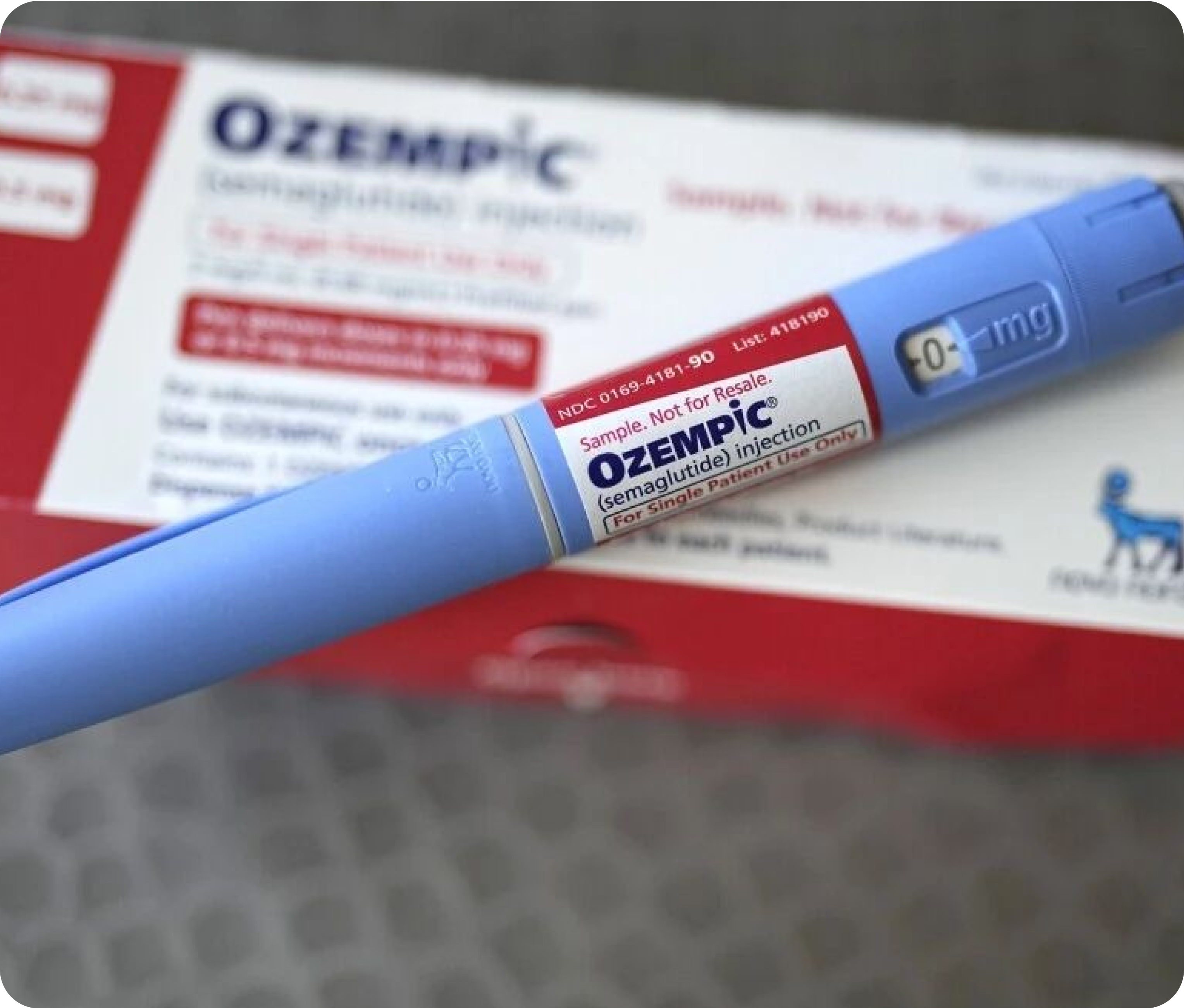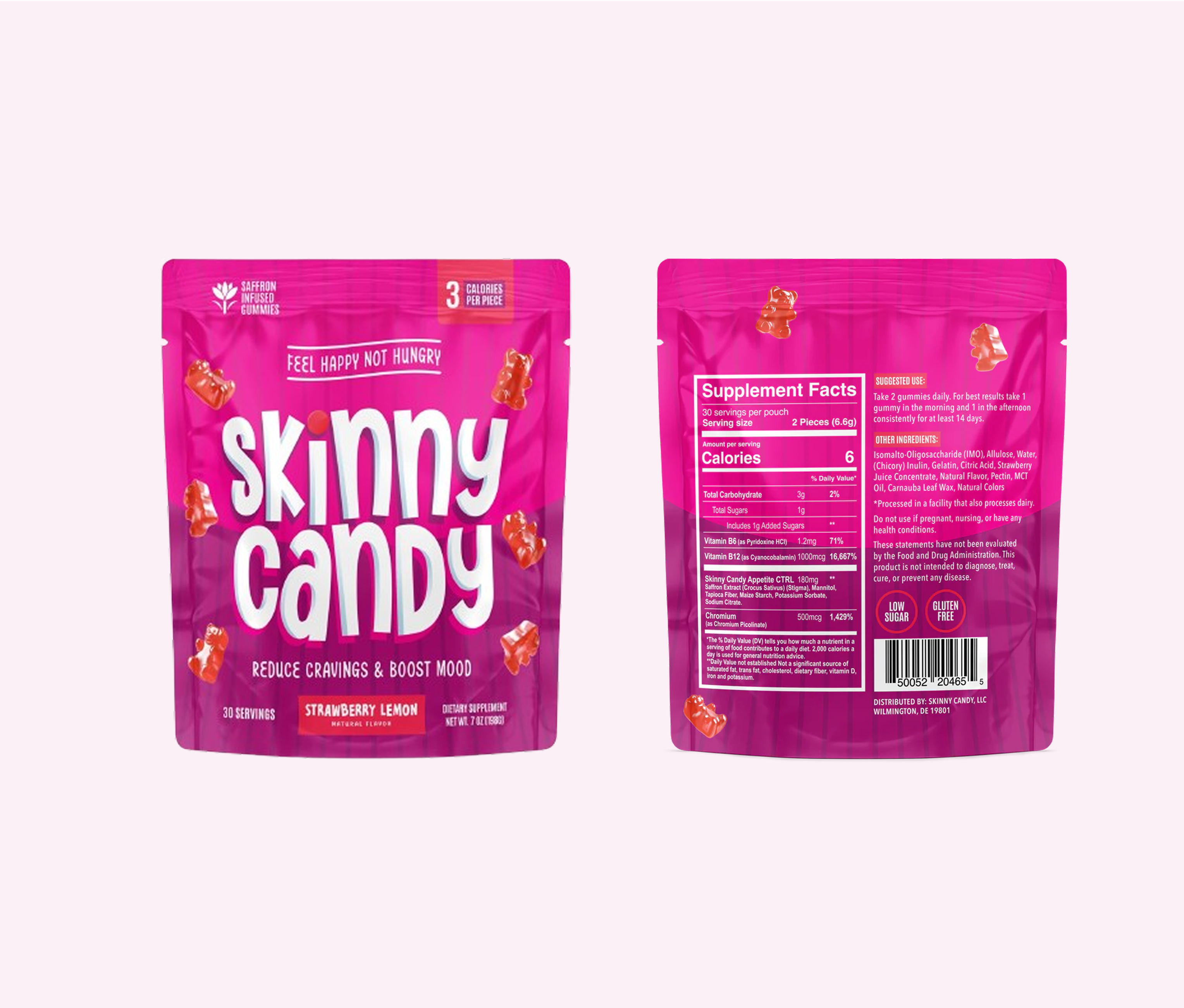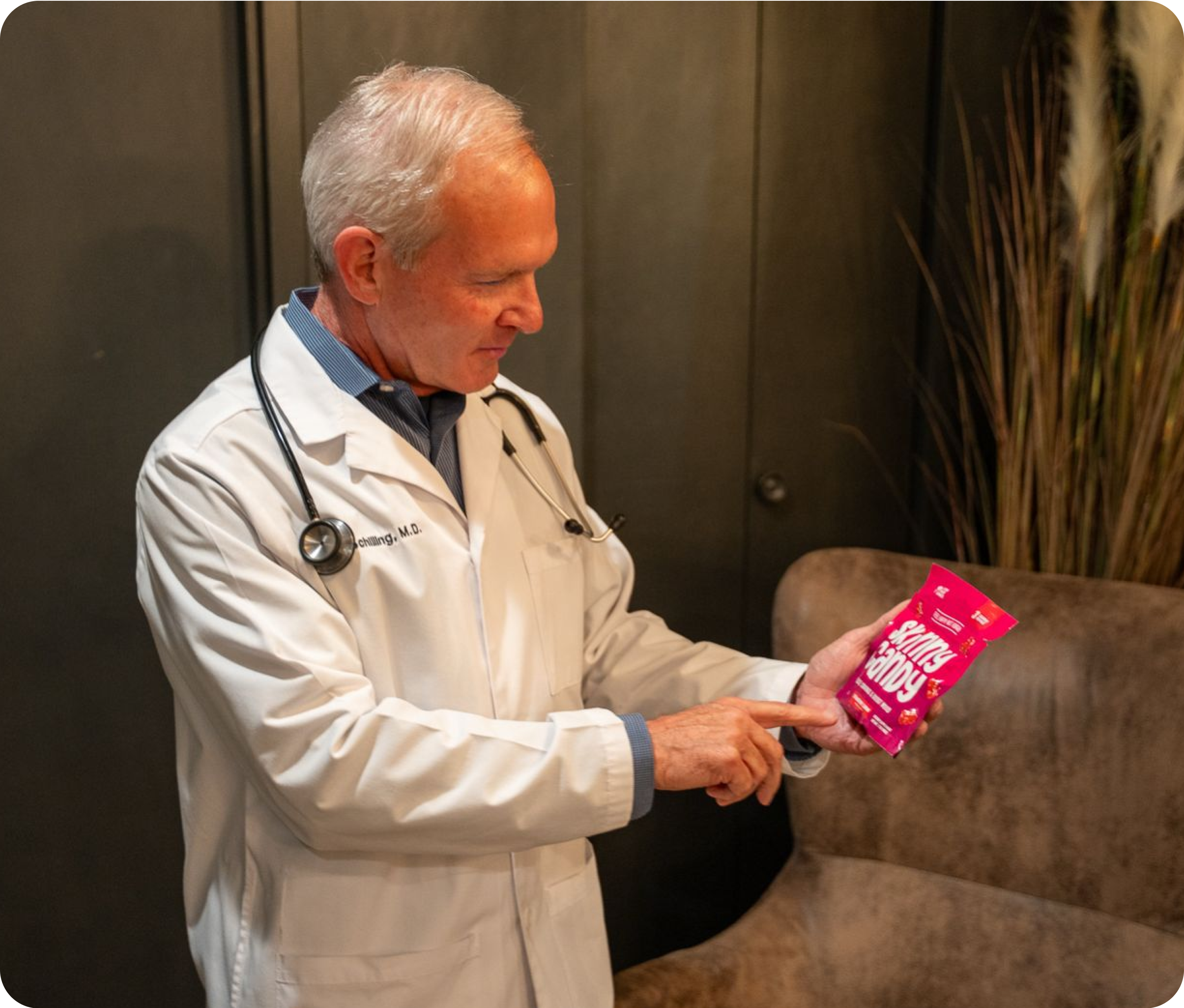Please note: This post may be sponsored by brands. However, this is my honest comparison based on my personal experience using these products. Thank you for visiting!
Doctor’s Perspective: Is Ozempic Worth the Risks, or Is Skinny Candy the Safer Choice?

By: DR. BLANE SCHILLING, M.D
Latest update: Aug 17, 2025

As a doctor, I’ve seen a surge of patients asking about Ozempic for weight loss. It’s been dominating headlines, and many believe it’s the ultimate solution.
But something made me take a closer look.
During a consultation, a patient asked me not just about Ozempic but about a new natural alternative she had read about Skinny Candy.
At first, I was skeptical. Could something as simple as a gummy even compare to a prescription injection that costs nearly $1,000 a month?
Still, I decided to investigate.

Is Ozempic really safe for long-term weight loss?

Could a natural alternative like Skinny Candy provide results without the risk of harsh side effects?

And most importantly, which option would I feel confident recommending to patients?
To answer, I compared both options side by side over 60 days, focusing on three key areas:

Ingredients & Safety

Effectiveness

Cost & Accessibility
What I discovered surprised even me and changed the way I guide patients who come to me seeking safe, lasting weight loss.

Scientific Studies and Efficacy: A Closer Look at Ozempic for Weight Loss
FDA Approval Status
Ozempic (semaglutide) is FDA-approved for type 2 diabetes management, not specifically for weight loss. While some patients do lose weight on Ozempic, this is considered an off-label use. That means the drug is being used outside of its official medical approval.
Clinical Trials
Several clinical trials have shown that semaglutide (the active ingredient in Ozempic) can lead to weight reduction. However, many of these studies:

Were conducted on patients with diabetes, not the general population.

Involved strict medical monitoring, which is not the reality for most everyday users.

Reported high dropout rates due to side effects like nausea, vomiting, and gastrointestinal discomfort.
Safety Concerns
Even in controlled settings, side effects are a major limitation:

Nausea, vomiting, diarrhea, and constipation are among the most common.

More serious risks include pancreatitis, gallbladder issues, and thyroid tumors (as listed in Ozempic’s own warning label).

Because of these risks, patients must be prescribed and monitored by a doctor, making self-use unsafe.
Accessibility
Finally, cost is a major barrier. At around $1,000 per month, Ozempic is prohibitively expensive for most people. And since it’s a prescription-only injectable drug, it cannot be purchased legally online.

Skinny Candy™ – Scientific Studies and Efficacy
Supresa® Saffron Extract (Appetite CTRL 180mg)
A double-blind, placebo-controlled clinical trial (Nutrition Research, 2010) found that saffron extract significantly reduced snacking frequency by 55% and promoted up to 69% appetite reduction in participants. Researchers attributed this effect to saffron’s impact on serotonin regulation, which helps curb emotional and stress-related eating.
Chromium
A randomized controlled trial published in the Journal of Psychopharmacology (2008) showed that chromium supplementation helped reduce carbohydrate cravings and appetite in women prone to overeating. Additional research confirms its role in stabilizing blood sugar levels, a critical factor in controlling hunger spikes and preventing excess fat storage.
Vitamin B6 & B12
A 2016 study in Nutrients highlighted the importance of B vitamins in supporting energy metabolism. By helping the body efficiently convert food into usable energy rather than stored fat, B6 and B12 reduce fatigue and enhance metabolic performance. Deficiencies in these vitamins are linked to low energy and sluggish metabolism, issues Skinny Candy directly addresses.

The scientific evidence clearly favors Skinny Candy’s formulation, as its key ingredients, Supresa® Saffron Extract, Chromium Picolinate, and B Vitamins (B6 & B12), have each been supported by clinical studies and peer-reviewed research for appetite control, mood balance, and energy support.
These studies consistently demonstrate their effectiveness in addressing the core challenges of weight management, from reducing stress-driven eating and cravings to supporting metabolism, energy, and appetite control.
In contrast, while Ozempic (semaglutide) has shown efficacy in weight loss, its supporting studies are focused largely on diabetic populations and are often funded or influenced by the pharmaceutical industry. More importantly, many patients report significant side effects such as nausea, digestive discomfort, muscle loss, and dependency risks, raising questions about long-term sustainability.
This stark difference in both the breadth and safety profile of scientific evidence suggests that Skinny Candy offers a safer, more holistic path to weight management without the harsh side effects linked to Ozempic.
The combination of well-studied, natural, and effective ingredients in Skinny Candy presents a strong case for its potential to deliver noticeable results in our 60-day evaluation.
Of course, the real proof lies in how it performs outside the lab which is exactly why our comparative test is so important. But based on the available evidence, Skinny Candy appears to hold a significant advantage in terms of proven safety, efficacy, and long-term wellness support.

A Safer, More Sustainable 60-Day Path to Weight Loss (Two Different Journeys)
When I evaluate weight loss solutions, I don’t just look at promises, I look at real-world impact. Over 60 days, I observed two very different approaches.
Patient A began using Ozempic:
The first week seemed encouraging, her appetite was reduced, and the scale moved quickly. But by week three, the side effects set in:

Nausea

Bloating

Fatigue
These made daily life difficult. She often skipped meals not because she felt healthy, but because she felt sick. By day 45, she was already questioning if the weight loss was worth the discomfort, and by day 60, she wanted to stop entirely.
Patient B began using Skinny Candy:

Improved energy (thanks to B6 & B12)

Better mood and reduced cravings (thanks to Supresa® Saffron Extract)
Midway through the 60 days, the benefits were clear:

Steadier fat loss

Better sleep

No negative side effects
By the end of the two months, she wasn’t just lighter, she felt more in control, and confident she could continue long-term.
The Verdict
Ozempic may deliver fast numbers on a scale, but it often comes with physical and emotional costs. Skinny Candy, in contrast, supported consistent, sustainable results that patients could maintain without fear or discomfort.

Why We Believe Skinny Candy is the Smarter Choice
When we compared what people get with Ozempic versus SkinnyCandy, the differences were striking:
Ozempic
Expensive ($1,000/month), prescription-only, not approved for weight loss, and often linked to uncomfortable side effects.
Skinny Candy
Affordable, non-prescription, made with natural compounds, and formulated to support weight management without harsh side effects.
Instead of leaving women feeling drained, nauseous, or bloated, Skinny Candy was created to help them feel lighter, calmer, and more in control of cravings all while supporting energy, mood, and metabolism.
The biggest takeaway?
Skinny Candy makes weight management feel doable and sustainable, without the risks or costs tied to medical injections.
If you’d like to explore both options for yourself, I’ve included the details and links below so you can easily compare.
Skinny Candy Price & Availability

Price: $39.99 per pack (30-day supply)

Where to Buy: Available exclusively online through the official Skinny Candy website.

Convenient Access: Ships directly to your door, no prescription required, no waiting rooms, no medical consultations.
Check out Skinny Candy here
Ozempic Price and Availability

Price: Around $1,000 per month (varies by insurance coverage)

Where to Buy: Prescription-only, available through pharmacies

Important Note: Ozempic is not FDA-approved for weight loss, it is intended for type 2 diabetes management. Using it for weight loss is considered off-label and comes with known risks.
Patients must consult a doctor and may face limited availability due to shortages.
Learn more about Ozempic